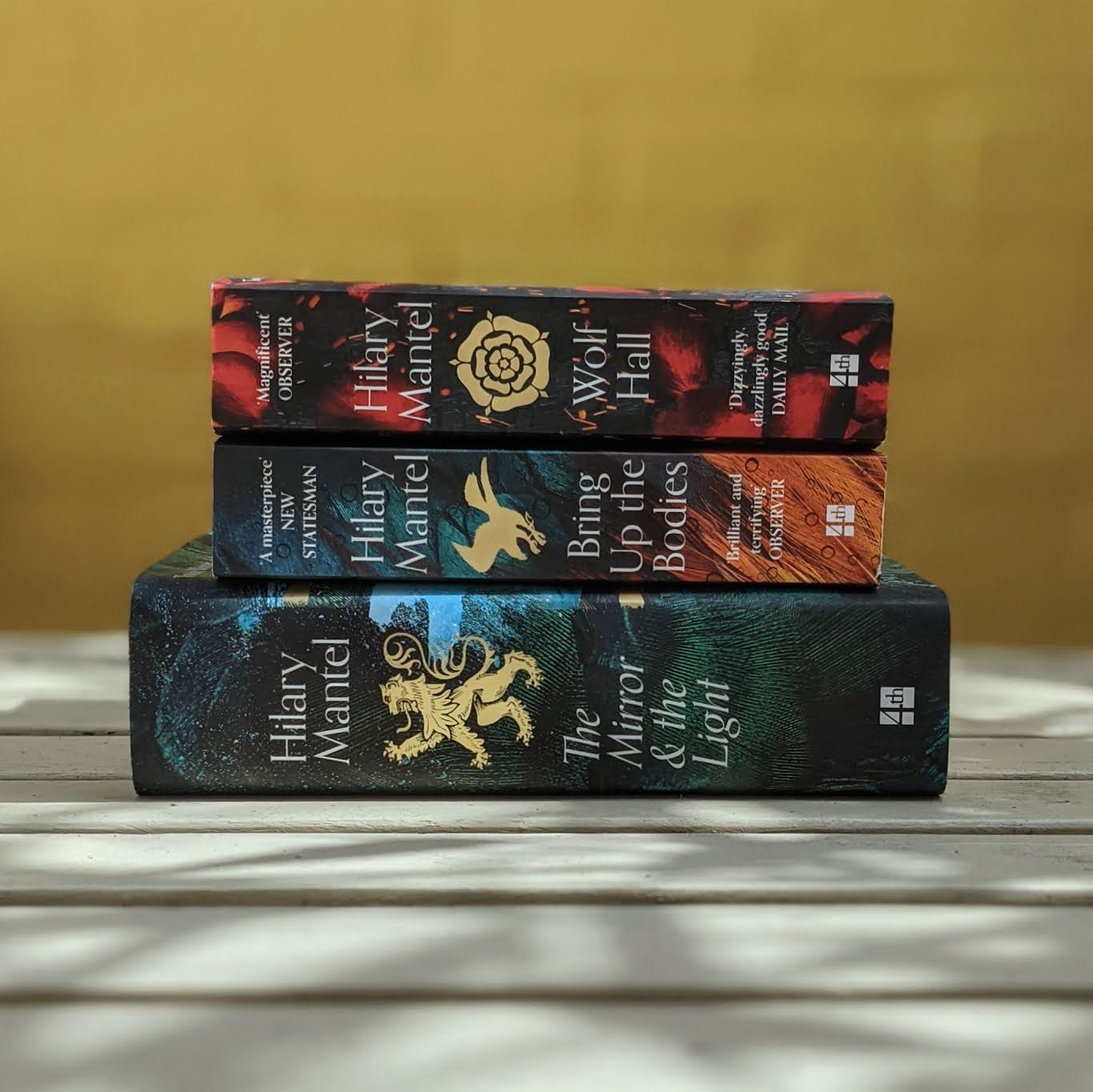So now, read Wolf Hall with us!
Friday Fireside #10 | Introducing the 2024 slow read of Hilary Mantel's Cromwell trilogy
Dear reader,
Today’s letter is all about Wolf Hall, the Cromwell trilogy, and why I would like to invite you to join us for a slow read of these books in 2024.
But my USP is to begin these letters with a creative tangent. So here is something I wrote long ago. A gentle pastiche of Wolf Hall. It sets the scene.
He, Cromwell
Listen to this tangent:
He sits alone at Austin Friars, behind towers of paper.
Letters from Bruges bankers; lists of monastic treasure; a recipe for torta di funghi; a design for a garden at Wolf Hall. It’s late, and the house is dark.
He thinks, who will write my story? What man will put his name to the life of Thomas Cromwell?
The King will not want for poets. Hacks will run ink wells dry, with tales of his majesty and splendour. Lies mostly. But the romance of kings will nourish England's soul for centuries to come. Anne? The Queen. Though God knows they have other names for her. A cult will gather around her. Sex, power and witchcraft will sell nicely in England. And make many a poor writer, comfortably rich.
Who will write Thomas More’s story? He, Cromwell, allows a smile. More has written his own story. Shared every thought he’s ever had with all of Christendom. A well-turned phrase for every season.
But he, himself, Cromwell? What man would dare tell his tale? He who has studied the art of dissimulation. Of passing unseen, in other men’s shadows. He who knows what happens to the low-born who fly too high and shine too bright. Made men can be un-made, and he wants to die old in his bed. In a house full of laughter and light.
No. If he appears in print, it will be the villain in another's story. Good King Henry’s wicked councillor. The man who led England away from Rome. Who boxed up saints. Threw monks on the street. And poisoned a king's mind with lowly passions, of power and greed.
A man who dared to rise. To get up. And stand in the place of a Lord, a Gentleman, a Person. To be more than the son of a blacksmith. His face blooded in the dirt.
No man could write that story. No man has the stomach, the heart. To see past his arranged face. And find where the ghosts walk and the bodies lie.
His thoughts run their course. He stands and leans to put out the candle.
A brief moment, a pool of light in the circling night. A ghost, beyond black. A woman sits before him. Pen poised. Eyes like midnight.
Then, darkness.
She, herself. Mantel.
This morning I finished Wolf Hall for the fourth time. It is an extraordinary book: a writer at the height of her abilities, laying out a story rich in meaning, ideas and feeling. More than most books I have read, it is eerily alive. It does something on the page that is comparable only to magic.
Over the last year, I have been reading another of my favourite books, War and Peace, accompanied by an enthusiastic and engaged community of readers. This experience has opened my eyes to the rich rewards of reading slowly and reading together.
So let’s read Wolf Hall, and its two sequels, together in 2024.
On the socials, we’re calling it #WolfCrawl because everyone loves a bad pun.
And here are some Frequently Asked Questions to help us on our way:
1. Why read Wolf Hall?
Let’s get the glittering prizes out of the way first.
Wolf Hall and Bring Up the Bodies both won the Booker Prize, and the final instalment, The Mirror and The Light, made it onto the longlist in 2020. In 2019, The Guardian compiled a list of the best 100 books of the 21st Century so far. Wolf Hall took the top spot.
Don’t care for prizes? I get you. Listen to what fellow writers had to say of Mantel on her passing last year:
“There was something boundless about Hilary Mantel’s imaginative process. She saw historical forces operating with immense clarity, but she also could create with real skill and flair the intimate moment, the tiny scene, the sudden shift of light or of power in a relationship.” Colm Tóibín
“It was always a pleasure to read such a smart, deft, meticulous, thoughtful writer, and one with such a grasp of the dark and spidery corners of human nature.” Margaret Atwood
“Mantel bristled with intelligence, looked at everything, saw everything.” Anne Enright
“Mantel was that rare writer whom you read and think, I have no idea how your brain goes where it goes, and how it comes back to produce the work that it does.” Kamila Shamsie
“As a writer, Mantel was fierce, fabulous and fearless. In her books, she took risks, she pushed back the boundaries of narrative, she grabbed hold of novelistic rules and shook them by the neck until they obeyed her.” Maggie O’Farrell
“What will we do without her? ‘All houses are haunted,’ she wrote. She haunts mine and cannot be shifted. What poor priest would dare?” Sarah Perry
Care not for these big beasts of the novelling world? Then listen just to this:
Wolf Hall is a book for anyone interested in what language can do. It is more than historical fiction, although it is that. It is a study of character, moral complexity and ambiguity, memory, myth-making and the birth of the modern world.
2. Who was Thomas Cromwell?
Not to be confused with his distant descendant Oliver Cromwell. Thomas was born in 1485, a common brewer’s son of Putney, then a village on the outskirts of London. He made himself useful, and rose in the service of Cardinal Wolsey to become Henry VIII’s chief minister in the 1530s. On 28 July 1540, he was beheaded for treason.
Cromwell was one of the main architects of the English Reformation. History has not been kind to him, primarily because of his role in bringing to the scaffold Thomas More and Anne Boleyn.
Thomas More was a humanist scholar who gave us the word utopia. He is regarded as a Catholic saint and martyr, and his life was immortalised in the play and film A Man for All Seasons. Anne Boleyn was King Henry’s second wife, and the mother of Elizabeth I. Boleyn faced some dubious charges of adultery, incest and treason. Her downfall was engineered by Cromwell, the man who made her queen.
Three books, three beheadings. Please read carefully.
3. Do I need to know the history first?
No.
OK, let me rephrase that. Any background knowledge of English and Tudor history is going to help. I studied this period at school and have been fascinated with the 1530s ever since.
But Wolf Hall is about people – characters – more than historical events. You’ll learn a lot of history reading it, but don’t be scared about going into it knowing nothing. As your host, I’ll be here all the way through with additional notes and resources so you should never feel lost.
4. Is it hard to read?
The style of writing in Wolf Hall can take some getting used to. The book is written entirely from Thomas Cromwell’s point of view. But he is rarely named and is mostly referred to only as “he”. Of course, he’s not the only man in the book, and it can be occasionally difficult to determine which “he” is being referred to. This is why we get the clarification “He, Cromwell” at various points in the text. But if in doubt: he is usually Cromwell.
This is deliberate, and we can talk next year about why Mantel chose to write like this. For now, I’ll say that this peculiar device is part of the genius of this book. If it were written in any other way, the effect would be significantly different.
And once your ear has adapted to Mantel’s style, you’ll be flying.
5. How do I keep track of all the characters?
Famously, Wolf Hall contains a lot of characters called Thomas. And that’s just the start: there are dozens of characters moving through this trilogy. Almost all are real historical people.
In my weekly updates, I will give you a list of the characters mentioned that week and clarify who they are and their story so far. There will be paintings and images to bring these people to life, and links for you to find out more.
Anyone who reads epic fantasy or historical family sagas will not be fazed by the enormous cast of Wolf Hall. For everyone else, I’m here to help!
6. What is a read along?
Ah, you’ve reached the fun bit! We can call it a book club, book group or reading group. I don’t mind. The basics are the same:
We are going to read the Cromwell trilogy throughout 2024. Each week, I will send you a newsletter with a recap, character list, resources and further discussion. I will follow this up with a discussion thread or chat thread on the substack website and app, where you can share your thoughts and ask questions.
I am your host, but it is your read along. Feel free to suggest, organise or collaborate on anything Cromwell-adjacent, online or offline, as the year rolls on. We might do a watch party of the BBC dramatisation or meet up at The Tower of London. I’m keen to do interviews and guest posts, so reach out to me if you are at all interested.
7. When does it start?
Monday 1 January 2024: We start Wolf Hall
Monday 29 April 2024: We start Bring Up The Bodies
Monday 22 July 2024: We start The Mirror and The Light
I will let you know the exact readings for each week nearer the time.
8. How much reading is there each week?
We have 2,007 pages ahead of us. On average, that is 38 pages a week. This varies between around 20 and 50 pages depending on the week. Mantel writes long chapters, so I’ve had to make some editorial decisions about how to divide things up.
9. Can I read at my own pace?
Of course! This isn’t school, and there are no rules. If you want to race ahead or saunter behind, if life gets in the way, or your curiosity gets the better of you, do what works for you. My posts and our discussion will always be here for you when you want them. All I desire is that you enjoy reading and get the most from the experience.
10. How do I join?
Make sure you are subscribed to Footnotes and Tangents for all the updates and discussion.
Then turn on notifications for the Cromwell Trilogy newsletter on the manage subscription page. This is turned off by default:
11. Is it free?
Ah, the $64 million question! Well, actually, the £35 question, which is what an annual subscription to Footnotes and Tangents costs.
But seriously, yes, the newsletter is free, the discussion threads are free, and reading is free (yay, libraries!).
However, each week there will be bonus notes for paying subscribers. A lot of time and thought goes into running this read along, so if you do value this resource and can afford it, I would really appreciate your support as a paying subscriber. Thank you!
In addition to keeping the show on the road, this will also allow me to gift complimentary subscriptions to engaged readers on low or no income. If that’s you, get in touch, so I can support your reading!
12. That’s it. Any further questions?
I hope you’ll join me next year. It’s going to be a fabulous experience and a wonderful adventure in reading, literature and history.
If you’ve got any further questions, leave me a comment or hit reply.
And if you know someone who might love this read along: what are you waiting for:?
In case you missed it…
And here’s last week’s Friday Fireside:
Oysters for the Creative Reader
Dear reader, “Now the world is your oyster.” The first books I read independently were the Dragon Pirate Stories by Sheila K McCullagh. These were graded readers that began by introducing three pirates: Benjamin the Blue, Roger the Red, and Gregory the Green. As the series progressed, the language and plot became mo…
Choose your own adventure…
You have been reading a Friday Fireside letter from me,
. You can pick and mix which letters you want to receive by turning on and off notifications on your manage subscription page. By default, you won’t receive read-along updates unless you choose to join one of them.









Really looking forward to it. Like the idea of a Tower of London meet up
Oh my gosh, Simon, this intro is very convincing!! I'm going to steal - er, borrow - a copy from my in-laws shelves next weekend 🤗